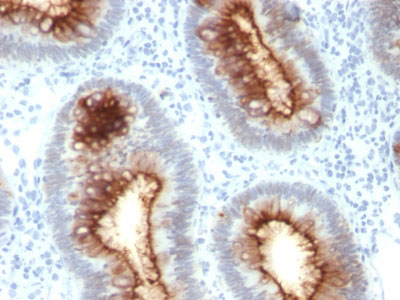Carcinoembryonic Antigen (CEA) / CD66 Antibody - With BSA and Azide
Mouse Monoclonal Antibody [Clone C66/1030 ]
- 产品详情
- 实验流程
- 背景知识
Application
| IF, FC, IHC-P |
|---|---|
| Primary Accession | P06731 |
| Other Accession | 1048, 634, 709196 |
| Reactivity | Human |
| Host | Mouse |
| Clonality | Monoclonal |
| Isotype | Mouse / IgG1, kappa |
| Clone Names | C66/1030 |
| Calculated MW | 76796 Da |
| Gene ID | 1048 |
|---|---|
| Other Names | Carcinoembryonic antigen-related cell adhesion molecule 5, Carcinoembryonic antigen, CEA, Meconium antigen 100, CD66e, CEACAM5, CEA |
| Application Note | IF~~1:50~200 FC~~1:10~50 IHC-P~~1:50~200 |
| Storage | Store at 2 to 8°C.Antibody is stable for 24 months. |
| Precautions | Carcinoembryonic Antigen (CEA) / CD66 Antibody - With BSA and Azide is for research use only and not for use in diagnostic or therapeutic procedures. |
| Name | CEACAM5 (HGNC:1817) |
|---|---|
| Function | Cell surface glycoprotein that plays a role in cell adhesion, intracellular signaling and tumor progression (PubMed:10864933, PubMed:10910050, PubMed:2803308). Mediates homophilic and heterophilic cell adhesion with other carcinoembryonic antigen-related cell adhesion molecules, such as CEACAM6 (PubMed:2803308). Plays a role as an oncogene by promoting tumor progression; induces resistance to anoikis of colorectal carcinoma cells (PubMed:10910050). |
| Cellular Location | Cell membrane; Lipid-anchor, GPI-anchor; Extracellular side. Apical cell membrane. Cell surface Note=Localized to the apical glycocalyx surface |
| Tissue Location | Expressed in columnar epithelial and goblet cells of the colon (at protein level) (PubMed:10436421). Found in adenocarcinomas of endodermally derived digestive system epithelium and fetal colon. |
For Research Use Only. Not For Use In Diagnostic Procedures.
Provided below are standard protocols that you may find useful for product applications.
BACKGROUND
This antibody recognizes proteins of 80-200kDa, identified as different members of CEA family. CEA is synthesized during development in the fetal gut and is re-expressed in increased amounts in intestinal carcinomas and several other tumors. This MAb does not react with nonspecific cross-reacting antigen (NCA) and with human polymorphonuclear leucocytes. It shows no reaction with a variety of normal tissues and is suitable for staining of formalin/paraffin tissues. CEA is not found in benign glands, stroma, or malignant prostatic cells. Antibody to CEA is useful in detecting early foci of gastric carcinoma and in distinguishing pulmonary adenocarcinomas (60-70% are CEA+) from pleural mesotheliomas (rarely or weakly CEA+). Anti-CEA positivity is seen in adenocarcinomas from the lung, colon, stomach, esophagus, pancreas, gallbadder, urachus, salivary gland, ovary, and endocervix.Ā
REFERENCES
Muraro R, et. al. Cancer Research, 1985, 45:5769-80. | Siler K, et. al. Biotechnology Therapeutics, 1993, 4(3-4):163-81. | Robbins PF, et. al. International Journal of Cancer, 1993, 53(6):892-7. |
终于等到您。ABCEPTA(百远生物)抗体产品。
点击下方“我要评价 ”按钮提交您的反馈信息,您的反馈和评价是我们最宝贵的财富之一,
我们将在1-3个工作日内处理您的反馈信息。
如有疑问,联系:0512-88856768 tech-china@abcepta.com.























 癌症的基本特征包括细胞增殖、血管生成、迁移、凋亡逃避机制和细胞永生等。找到癌症发生过程中这些通路的关键标记物和对应的抗体用于检测至关重要。
癌症的基本特征包括细胞增殖、血管生成、迁移、凋亡逃避机制和细胞永生等。找到癌症发生过程中这些通路的关键标记物和对应的抗体用于检测至关重要。 为您推荐一个泛素化位点预测神器——泛素化分析工具,可以为您的蛋白的泛素化位点作出预测和评分。
为您推荐一个泛素化位点预测神器——泛素化分析工具,可以为您的蛋白的泛素化位点作出预测和评分。 细胞自噬受体图形绘图工具为你的蛋白的细胞受体结合位点作出预测和评分,识别结合到自噬通路中的蛋白是非常重要的,便于让我们理解自噬在正常生理、病理过程中的作用,如发育、细胞分化、神经退化性疾病、压力条件下、感染和癌症。
细胞自噬受体图形绘图工具为你的蛋白的细胞受体结合位点作出预测和评分,识别结合到自噬通路中的蛋白是非常重要的,便于让我们理解自噬在正常生理、病理过程中的作用,如发育、细胞分化、神经退化性疾病、压力条件下、感染和癌症。






